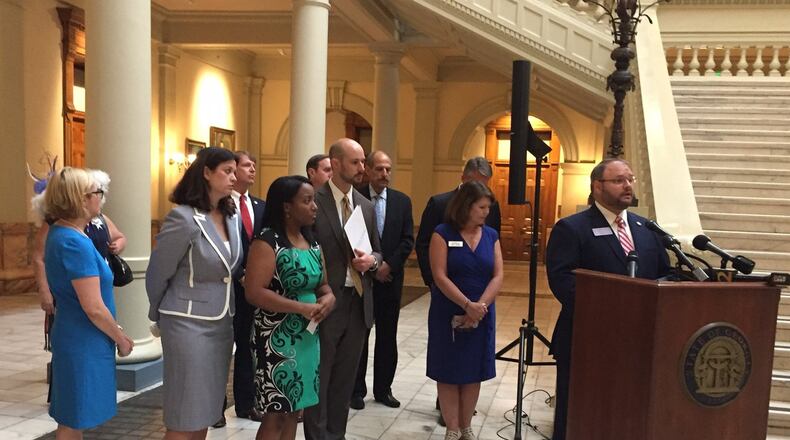Legislation that would extend the statute of limitations for lawsuits by alleged victims of child sexual abuse has passed a key committee of the Georgia House of Representatives.
House Bill 605, the Hidden Predator Act, by Rep. Jason Spencer, R-Woodbine, would change the statute of limitations to age 38 from the current 23.
Perhaps most controversially, it also would open a 1-year window when anyone of any age could sue both their alleged abuser and any “entity,” such as a church or youth group, that had supervisory authority when the alleged abuse occurred.
The bill had been locked in a subcommittee until last week. On Monday, it finally got a hearing in the House Judiciary Non-Civil Committee, which voted unanimously to send it to the full House.
The legislation builds on a law Spencer got passed three years ago, part of which expired last year. He issued a statement Monday thanking his colleagues and “all of the advocates for child sexual abuse survivors who have given me the motivation to seek updates to this groundbreaking law, which has already uncovered serious and egregious secretive crimes against children.”
Experts said at hearings on the current proposal that more than a dozen lawsuits were enabled as a result of the 2015 law.
Spencer has said that lobbyists representing the Boy Scouts of America, the Georgia Catholic Conference, the insurance industry and the Georgia Chamber of Commerce have worked behind the scenes against the bill.
The Boy Scouts said earlier this month that they "strongly support certain parts" of the proposal while objecting to other parts, contending that the bill, as it was then crafted, "does not strengthen efforts that experts agree can help keep children safe and includes provisions that would hinder the ability of youth-serving organizations to protect the children they serve."
The group didn’t explain how the proposal would hinder efforts to protect children.
There have been few substantial changes to the bill since it was introduced except one that reduced the proposed “discovery” window for lawsuits. The window allows alleged victims to sue beyond the statute of limitations but within a specified period of discovering new medical or psychological evidence of enduring injury resulting from the alleged abuse. Current law sets that period at two years; Spencer initially proposed extending it to eight years but consented this month to extending it only to four.
The bill must pass the full House of Representatives by Wednesday to win a chance at passage in the Senate and the possibility of becoming law.
MYAJC.COM: REAL JOURNALISM. REAL LOCAL IMPACT.
The AJC's Ty Tagami keeps you updated on the latest happenings in K-12 education issues affecting Georgia. You'll find more on myAJC.com, including these stories:
Never miss a minute of what's happening in state and local education. Subscribe to myAJC.com.
About the Author





